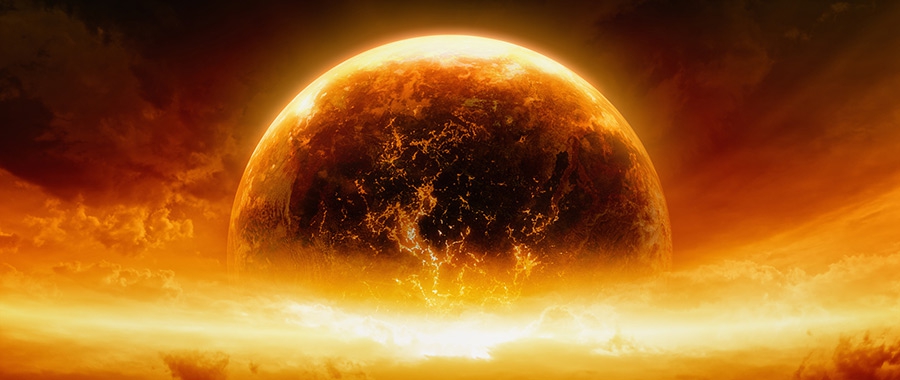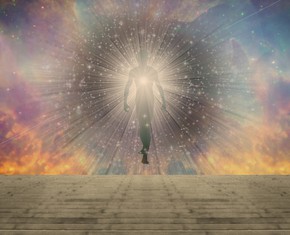The views expressed in our content reflect individual perspectives and do not represent the authoritative views of the Baha'i Faith.
In some form or another, the world’s major religions predict the manner in which human history will be consummated.
In the JudeoChristian-Islamic traditions there are references to the Day of Judgment. This is commonly interpreted as a time when God will judge between the righteous and the wicked, when good will triumph over evil, and the faithful will be rewarded. Many among the Christians and Muslims take this to mean that the physical Earth will be destroyed. They believe that history as we know it will come to an end, while the righteous continue to exist in heaven and the damned suffer in an eternal hell.
The Baha’i writings explain that the Day of Judgment is a reality that operates on several levels.
Whenever a messenger of God appears in the world, that time becomes a “Day of Judgment,” in the sense that humanity is faced with the test of either accepting or rejecting that new messenger and his message. By the same token, the new prophet of God abrogates old laws and brings new teachings, which are also a form of “judgment,” establishing a new era in human society. In other words, old concepts and practices are judged to be outdated and are replaced with new ones more suited to the new level of human development.
In this day the concept of divine judgment still applies. This is the era in which God’s newest manifestation, Baha’u’llah, has abrogated the old world order and inaugurated a new one. This particular “Day of Judgment” has been the focus of prophetic expectations because it marks the realization of the long-cherished hope of peace, justice, and happiness for all.
The Kingdom of God on Earth
When the Day of Judgment comes, many religious traditions assert, it will establish God’s kingdom on Earth. The Baha’i concept of the means by which God’s Kingdom will be established is certainly at variance with the expectations of many people. There are at least three important differences:
First, the Baha’i teachings don’t present the establishment of the kingdom of God as a sudden event accompanied by physical marvels. The physical sun, stars, and heavens will not be destroyed. A new Jerusalem will not come down from heaven in the literal sense. Baha’is believe that these and some other signs are to be taken symbolically. Some are literal, however—for example, the notion of the special destiny of the Holy Land. Usually it is clear from context when it is necessary to choose a literal interpretation. As we have seen in the case of both Christ and Baha’u’llah, the messengers of God also offer explanations that help us to discern the difference between literal and symbolic meanings.
Second, the Kingdom of God will be built through the agency of human beings who have been inspired by the teachings of Baha’u’llah, and who will also be aided by him through the assistance of the holy spirit. This is precisely how Christianity spread; that is, through the efforts of the early Christian believers in spreading the gifts of the holy spirit to others.
Third, the building of God’s kingdom is a gradual process that will continue forever. Eventually a day will come when war ends and peace and justice are established, but civilization will continue to evolve beyond that point. More manifestations of God will appear in future ages to continue guiding humanity forward.
We might well ask why the process is a gradual one. Baha’u’llah explains that it is necessary in every new religious dispensation for the full powers of divine revelation to appear in stages. Otherwise humanity would be incapable of sustaining its force:
Know of a certainty that in every Dispensation the light of Divine Revelation hath been vouchsafed unto men in direct proportion to their spiritual capacity. Consider the sun. How feeble its rays the moment it appeareth above the horizon. How gradually its warmth and potency increase as it approacheth its zenith, enabling meanwhile all created things to adapt themselves to the growing intensity of its light. How steadily it declineth until it reacheth its setting point. Were it, all of a sudden, to manifest the energies latent within it, it would, no doubt, cause injury to all created things …. In like manner, if the Sun of Truth were suddenly to reveal, at the earliest stages of its manifestation, the full measure of the potencies which the providence of the Almighty hath bestowed upon it, the earth of human understanding would waste away and be consumed; for men’s hearts would neither sustain the intensity of its revelation, nor be able to mirror forth the radiance of its light. Dismayed and overpowered, they would cease to exist. – Gleanings from the Writings of Baha’u’llah, pp. 87-88.
The Baha’i teachings say that today the center of guidance for humanity, responsible for leading the vast enterprise of building God’s kingdom, is the Universal House of Justice. Its seat is on Mount Carmel, across the Bay of Haifa from the scene of Baha’u’llah’s final imprisonment and in the shadow of the shrine of His Prophet-Herald, the Bab.
Although Baha’u’llah did not fulfill popular expectations, his advent represents the fulfillment of God’s ancient promise conveyed in such passages as the following verse from the Old Testament:
And many people shall go and say, Come ye, and let us go up to the mountain of the Lord, to the house of the God of Jacob; and he will teach us of his ways, and we will walk in his paths: for out of Zion shall go forth the law, and the word of the Lord from Jerusalem.
And he shall judge among the nations, and shall rebuke many people: and they shall beat their swords into plowshares, and their spears into pruninghooks: nation shall not lift up sword against nation, neither shall they learn war any more. – Isaiah 2:3-4.
In the New Testament we find this passage in Revelation 21:1–4:
And I saw a new heaven and a new earth: for the first heaven and the first earth were passed away; and there was no more sea.
And I John saw the holy city, new Jerusalem, coming down from God out of heaven, prepared as a bride adorned for her husband.
And I heard a great voice out of heaven saying, Behold, the tabernacle of God is with men, and he will dwell with them, and they shall be his people, and God himself shall be with them, and be their God.
And God shall wipe away all tears from their eyes; and there shall be no more death, neither sorrow, nor crying, neither shall there be any more pain: for the former things are passed away.
















Comments
Sign in or create an account
Continue with Googleor